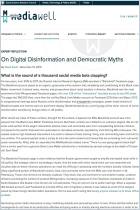
You are probably spreading misinformation. Here’s how to stop.
A citizen’s guide to not helping trolls, bots and other online disinformers during turbulent times.
Recommendation
Most social media users know not to “feed the trolls” – that is, not to engage with social media posters who try to provoke controversy and don’t care about debate or discourse. They seek only to boost their engagement numbers and spread disinformation. But can cute memes also be malicious? Tech journalist Geoffrey A. Fowler says yes, they can. He offers insight into disinformation campaigns and shares tips from experts he consulted about the 2020 explosion of fake news around George Floyd’s murder, the Black Lives Matter protests and the COVID-19 pandemic. Fowler’s evergreen advice: Learn to avoid unwittingly spreading disinformation – even if it seems to be just a harmless image of a cute dog with a flag.
Summary
About the Author
Geoffrey A. Fowler is the technology columnist for The Washington Post.















Comment on this summary or Démarrer une discussion